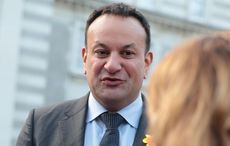The leader of Britain’s main opposition party has backed a vote on a united Ireland. When questioned by the BBC as to whether he would back a referendum on unification Labor leader Jeremy Corbyn replied, “That’s up to the people of Northern Ireland to decide. If the Northern Ireland Assembly wants to have one then they should be allowed to.”
His support comes as Sinn Féin - fresh off of huge electoral gains in this month’s Assembly elections - are renewing their demand for a border poll.
The party’s leader in Northern Ireland, Michelle O’Neill, said Britain’s impending departure from the European Union meant Ireland needed to unite “as soon as possible”.
"They [the British Government] are continuing to refuse to listen to the views of the majority. Brexit would be a disaster for the economy and the people of Ireland,” she said.
"To us in Sinn Fein that increases the urgency for the need of a referendum on Irish unity and that needs to happen as soon as possible."
Corbyn’s backing for such a poll will surprise few. The left winger has long supported Irish unity and was fiercely condemned by sections of the British press after it emerged that in 1987 he stood for a minute’s silence in memory of eight dead members of the IRA.
He also invited representatives of the IRA to the British Parliament only a fortnight after the organization unsuccessfully tried to assassinate Margaret Thatcher in 1984.
However despite Sinn Féin’s calls and Corbyn’s backing such a vote has already been dismissed as “premature” by Ireland’s Minister for Foreign Affairs Charlie Flanagan.
A majority in the Northern Ireland Assembly would also likely vote against holding such a vote at this time.
The British Government has also made clear it has no interest in referendum. Under the Good Friday Agreement only when the result of any such referendum is likely to be one in favor of unity would one be agreed to and polling currently suggests that would likely not be the case.
Speaking in the British Parliament shortly after his appointment as Secretary of State for Northern Ireland last year James Brokenshire made clear he was not interested in pursuing the matter.
“The conditions [for a referendum] are set out very clearly in relation to the Belfast Agreement and I have been very clear that I do not think those conditions have been met," he told legislators.
In response to questioning in the House of Commons this week in the wake of her letter to the EU formally beginning Britain’s exit from the bloc, May seemed to quash the idea that a Government she lead would back a border poll.
“We have a preference that Northern Ireland should remain part of the United Kingdom, and we will never be neutral in expressing our support for that. And that’s because I believe fundamentally in the strength of our union,” she told Danny Kinahan, the Ulster Unionist MP for South Antrim.
The British Government has also fobbed off a request from the Scottish Government for a second independence referendum. Like in Northern Ireland, voters in Scotland opted to remain in the EU last year and First Minister Nicola Sturgeon sees this as justification enough for a rerun of the failed referendum from 2014.
May responded that “now is not the time”. Any formal request from Irish politicians for a border will likely be met with an identical response.




Comments